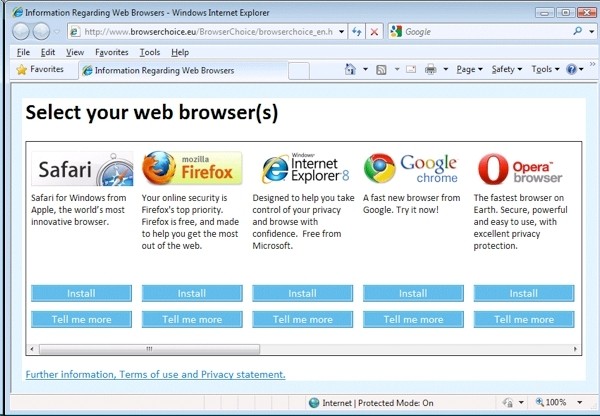The European Commission has launched a formal investigation on Microsoft over its failure to comply with commitments made in 2009 to settle a browser antitrust case. Back then the software giant had agreed to implement a ballot screen in Windows that would let European users choose a default browser from among 12 options presented in random order. The measure came into effect on February 22, 2010.
Apparently Microsoft did not include the mechanism in Windows 7 Service Pack 1, however, which has prevented 28 million PCs running the software from its release in February 2011 up until now to see the browser choice screen. The software giant was quick to respond to the European Commission's concerns, attributing the oversight to a "technical error" and promising to remedy the problem via an update.

EU Competition Commissioner Joaquin Almunia isn't taking it lightly. "We take compliance with our decisions very seriously. And I trusted the company's reports were accurate. But it seems that was not the case, so we have immediately taken action," Almunia said. Companies found to have breached legally binding commitments with the EC may be fined up to 10% of their total annual turnover.
The choice screen was delivered correctly to PCs running the original version of Windows 7, and to the relevant versions of Windows XP and Windows Vista. Microsoft estimates these make up around 90% of the PCs that should have received it. The company has already begun distributing a fix and offered to extend period for which it agree offer the browser choice screen by another 15 months.
Additionally, Microsoft asked a third party to conduct a "formal investigation" into how the technical error occurred and says it will provide a full report to the European Commission when their work is complete.
In all fairness it seems Microsoft is doing its part to amend the mistake and it doesn't look like it 'affected' a majority of its European users either. It's clear they don't want to face another hefty fine on top of the €1.64 billion it has had to pay for not complying with another EC ruling that goes back to 1998.